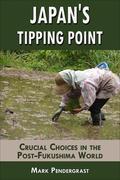JAPAN'S TIPPING POINT is a small book on a huge topic. In the post-Fukushima era, Japan is the "canary in the coal mine" for the rest of the world. Can Japan radically shift its energy policy, become greener, more self-sufficient, and avoid catastrophic impacts on the climate? Mark Pendergrast arrived in Japan exactly two months after the Fukushima meltdown. This book is his eye-opening account of his trip and his alarming conclusions. Japan is at a crucial tipping point. A developed country that must import all of its fossil fuel, it can no longer rely on nuclear power, following the massive earthquake/tsunami/nuclear disaster of March 11, 2011. Critically acclaimed nonfiction writer Mark Pendergrast went to Japan to investigate Japan's renewable energy, Eco-Model Cities, food policy, recycling, and energy conservation, expecting to find innovative, cutting edge programs. He discovered that he had been naive. The Japanese boast of their eco-services for eco-products in eco-cities. Yet they rely primarily on imported fossil fuel and nuclear power, live in energy-wasteful homes, and import 60% of their food. That may be changing in the wake of the Fukushima nuclear disaster. Maybe. But as Pendergrast documents, Japan lags far behind Europe, the United States, and even (in some respects) China in terms of renewable energy efforts. And Japan is mired in bureaucracy, political in-fighting, indecision, puffery, public apathy, and cultural attitudes that make rapid change difficult. Yet Japan is also one of the most beautiful countries in the world, with friendly, resilient people who can, when motivated, pull together to accomplish incredible things. As an island nation, Japan offers a microcosmic look at the problems facing the rest of the globe. And as Japan tips, so may the world. Mark Pendergrast, the author of books such as For God, Country and Coca-Cola, Uncommon Grounds, and Inside the Outbreaks, entertains as he enlightens. As he wrote in Japan's Tipping Point: "The r
-
- Categories
- Other
- Australia
- China
- New Zealand
- United States
- United Kingdom
- France
- Spain
- Italy
- Turkey
- Germany
- Malaysia
- Mexico
- Austria
- Russia
- Ukraine
- Thailand
- Saudi Arabia
- Greece
- Canada
- Poland
- Netherlands
- Singapore
- Hong Kong
- Taiwan
- South Korea
- Japan
- Brazil
- Argentina
- Indonesia
- Vietnam
- India
- Morocco
- South Africa
- Tunisia
- Zimbabwe
- Algeria
- Kenya
- Egypt
- United Arab Emirates
- Syria
- Jordan
- Iran
- Israel
- Qatar
- Dominican Republic
- Chile
- Puerto Rico
- Peru
- Uruguay
- Costa Rica
- Mauritius
- Sweden
- Nepal
- New
- Popular
- Gifts
- Videos
- Help / Contact Us
- Terms & Privacy
- What is TripTerest


